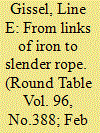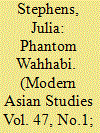| Srl | Item |
| 1 |
ID:
077169


|
|
|
|
|
| Publication |
2007.
|
| Summary/Abstract |
Focusing on young peoples' articulation of modernity in the imperial and the postcolonial contexts, this paper compares the winning essays submitted to the 1920s Empire Essay Competition with the 21st century entries in the Commonwealth Essay Competition. While the early essays articulate a universal notion of progress as the road to Anglo-Saxon state- and nationhood, the essays of today critically assess and critique modernity. The article argues that today's young people are engaged in a project of negotiating and redefining the modern, essentially a search for a historically and culturally particular modernity. In this way, the young writers become the producers of their own modernity, rather than the consumers of a Western modernity
|
|
|
|
|
|
|
|
|
|
|
|
|
|
|
|
| 2 |
ID:
132007


|
|
|
|
|
| Publication |
2014.
|
| Summary/Abstract |
William Eleroy Curtis was central to the creation of the Pan-American movement in the United States. As a lobbyist and bureaucrat, he helped organize the first Inter-American Conference in 1889-1890. As a journalist he became a leading "expert" on Latin America. This article uses Curtis to explore the relationship between Pan-Americanism and empire. Before 1898, Curtis sought only expanded trade, not territory for the United States. However, to explain why the country would "naturally" come to dominate Latin American markets, he depicted Latin Americans as backward yet capable of uplift through the infusion of U.S. knowledge and capital. He thus justified hemispheric control and helped U.S. Americans envision empire as a tutelary imperative. When Curtis supported territorial expansion in 1898 he did so in the language of civilizing mission rather than market aggrandizement. In combining narratives of difference and equality, Pan-Americanism served Curtis as a transitional imperial ideology.
|
|
|
|
|
|
|
|
|
|
|
|
|
|
|
|
| 3 |
ID:
121944


|
|
|
|
|
| Publication |
2013.
|
| Summary/Abstract |
In the late 1860s and early 1870s the British colonial government in India suppressed an imagined Wahhabi conspiracy, which it portrayed as a profound threat to imperial security. The detention and trial of Amir and Hashmadad Khan-popularly known as the Great Wahhabi Case-was the most controversial of a series of public trials of suspected Wahhabis. The government justified extra-judicial arrests and detentions as being crucial to protect the empire from anti-colonial rebels inspired by fanatical religious beliefs. The government's case against the Khan brothers, however, was exceptionally weak. Their ongoing detention sparked a sustained public debate about the balance between executive authority and the rule of law. In newspapers and pamphlets published in India and Britain, Indian journalists and Anglo-Indian lawyers argued that arbitrary police powers posed a greater threat to public security than religious fanatics. In doing so, they embraced a language of liberalism which emphasized the rule of law and asserted the role of public opinion as a check on government despotism. Debates about the Great Wahhabi Case demonstrate the ongoing contest between authoritarian and liberal strands of imperial ideology, even at the height of the panic over the intertwined threat of Indian sedition and fanatical Islam.
|
|
|
|
|
|
|
|
|
|
|
|
|
|
|
|